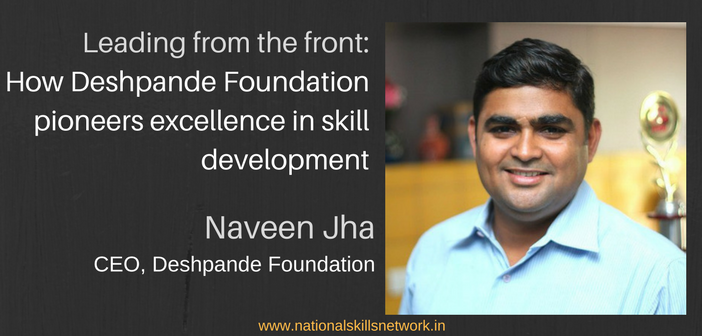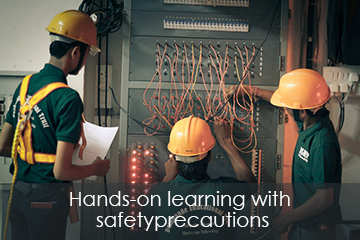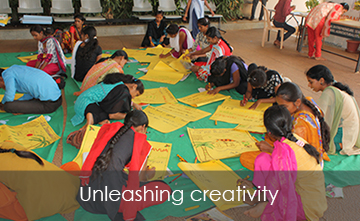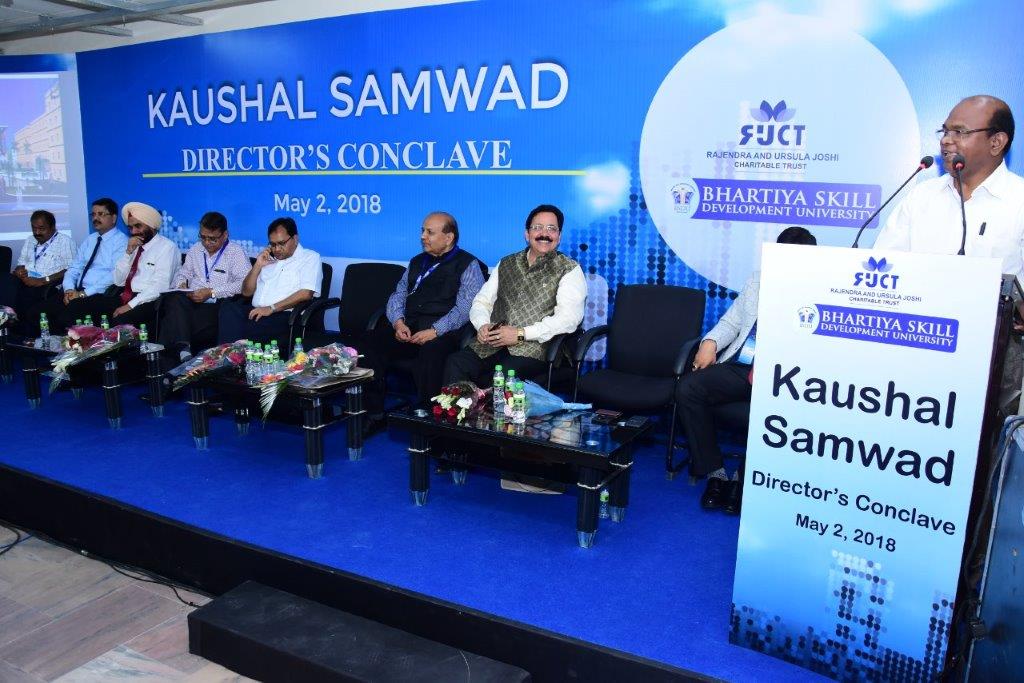Deshpande Foundation, through the Deshpande Educational Trust (DET), has implemented pioneering innovative models and methods in skilling the youth and promoting entrepreneurship. In this interview, Naveen Jha, CEO, Deshpande Foundation, shares the Skill Story of DET and tells us how they have established new benchmarks by adhering to global standards for quality and efficiency.
NSN: What are some of the challenges of tier 2 and tier 3 cities and towns while promoting vocational education and how do you face them?
Naveen Jha: There is a huge gap between education and employment; while the number of graduates increase, employable youth remain hard to find. Let me start with a question. Despite having millions of students graduating from colleges and universities every year, why do the likes of Infosys and TCS and other small and medium corporates run in-house programs to train fresh recruits to make them job ready? It’s apparently because our college and university education systems are unable to catch up with necessary skills and the right mind-set required at the workplace, resulting in a huge ‘skill gap’, forcing the enterprises to run parallel training programs. Even than companies are really struggle to onboard right work ethics human resource.
The problem is more acute and visible in tier 2 and tier 3 cities. I have travelled across Karnataka, Telangana, Maharashtra, Andhra Pradesh, Uttar Pradesh, Rajasthan, and Bihar, visiting rural and semi-urban areas. The organizations in smaller towns and cities in the country are finding it difficult to get skilled, articulate, and confident graduates for entry-level jobs.
NSN: How do you create awareness about vocational education and training among youth in Karnataka and elsewhere?
Naveen Jha: The candidates who graduate from our training programs are our best ambassadors. Not just in Karnataka, youth from other states also come and join our program seeing the success of their friends and peers.
The bottom line is, if the programs are effective, delivering value and helping fellows find good career options, there is no need to spend much energy on creating awareness and publicizing. So far, we have not given any advertisement for recruitment. We have graduated and placed 5000+ candidates in last 3-4 years.

NSN: How do you succeed in mobilising youth and creating aspirational value around skill-based learning?
Naveen Jha: Our programs are designed for the youth from rural and semi-urban areas in different parts of the country. They come from humble socio-economic backgrounds. They are a kind of disillusioned with the traditional, semi functional education delivery and they have received from our college and the university education system. They basically lack basic exposure, practical experience and communication skills. What they need is a rigorous learning environment in which they receive hands-on experience with industry exposure.
Though initially, candidates may find it harder to cope with the rigorous learning environment at DET. But soon, they start liking it as they see value. The learning they pick up during the training programs boosts their confidence. The industry exposure they receive with our learning partners from the corporate and the social sector drives their enthusiasm. The biggest advantage with DET is the presence of in-house trainers who understand and relate with each and every candidates and pays them personal attention to become confident, industry-ready professionals. Due to our strong alumni network, we invite inspiring alumni and role models to visit our campus and talk to our trainees. These motivational my stories sessions inspire DET candidates.
Overall, the design of the programs, the delivery mechanism, focus on developing multiple skills, excellent post-program support with placement make our fellows aspirational and successful. In turn, it mobilizes more youth to join our programs, which is also the reason for the rapid scaling of the DET.
NSN: What about placements for trainees, do they migrate to the cities, how do you address post-placement issues?
Naveen Jha: Apart from equipping our students with skills for employment, we take our promise of skilling India a step further, by providing them with placement opportunities. DET has an 75% placement record, while most of the remaining percentage of people go for higher studies. We have been quite fortunate to build a strong network of partners over the years, for funding and placement.
 Owing to the transformational change we have been bringing at the ground level, we continue to add to our list of partners, with new opportunities for graduates with every passing year. Some of our students have employment with our own programs, with them finding their true passion once at the DET campus. We continuously support our students even after their graduation and we have a strong alumni network. We have every week 2-3 alumni speaks with the current batches and share their stories which has helped us to provide the vision to current trainees how they can handle the post placement situation. DET also offers post-placement assistance, with helplines and regular follow-ups to make sure that our graduates are comfortable in their work environment.
Owing to the transformational change we have been bringing at the ground level, we continue to add to our list of partners, with new opportunities for graduates with every passing year. Some of our students have employment with our own programs, with them finding their true passion once at the DET campus. We continuously support our students even after their graduation and we have a strong alumni network. We have every week 2-3 alumni speaks with the current batches and share their stories which has helped us to provide the vision to current trainees how they can handle the post placement situation. DET also offers post-placement assistance, with helplines and regular follow-ups to make sure that our graduates are comfortable in their work environment.
NSN: Tell us more about the training programs – your model, emphasis on practical work, compliance with NSQF and other aspects?
 Naveen Jha: The DET approach is to deliver unique experiential short-term skill training, supplementing it with strong work ethics culture. Our on-ground assignments are designed to encourage our students to go through a life transforming experience, to find opportunities in challenges, and to solve problems. Our programs emphasize on 21st century skills like leadership, problem solving, communication, conflict management, team work, and adapting to changing environment.
Naveen Jha: The DET approach is to deliver unique experiential short-term skill training, supplementing it with strong work ethics culture. Our on-ground assignments are designed to encourage our students to go through a life transforming experience, to find opportunities in challenges, and to solve problems. Our programs emphasize on 21st century skills like leadership, problem solving, communication, conflict management, team work, and adapting to changing environment.
The following define the model and the uniqueness of our training programs:
Rigorous short-term residential program: Most of our programs are of 4 – 6 months duration and the fellows spend more than 10 hours a day in learning.The idea is to provide a minimum of 120+ days of rigorous learning environment to the fellows. We believe it is important for them to stay in one place and get constant exposure to diverse learning opportunities.
In-house trainers familiar with students’ background: We have a pool of about 100 + trainers who understand work culture, pedagogy, internal processes, delivery mechanism and the value system, and help candidates learn beyond the usual teaching style. Developing a learning environment at each center
Practice-oriented, hands-on learning: DET fellows spend most of their time either on the campus or with the industry, learning by practice rather than theory. Our association with several organizations provides real-world scenarios for our students to discover and learn in live mode. The fellows learn by doing and this is one of the biggest value additions that sets DET apart from the traditional education providers.
Focus on work ethics and multi-skills: From simple tips on how to reach office in time to communicating with customers to troubleshooting in times of crisis, DET fellows are equipped to manage everything. All fellows, irrespective of the programs, are trained in communicative English, IT skills, strong work ethics and entrepreneurial skills. One of the reasons for the high rate of placement of DET fellows is that they are multi-skilled, confident, articulate and manage crisis with confidence.
Empowering female youth: One key area that DET focused on since the beginning was to address the gender bias that is even more pronounced in India’s rural areas. By maintaining a male to female ratio of 55:45, DET continuously reinforces gender equality and empowering women, thus creating a more equitable society that encourages women in the workforce. We are proud to have several girls from conservative backgrounds becoming role models in their families, communities and organizations, and emerge as the torch-bearers of a new India. Also it gives learning opportunity to work and understand gender roles in work place, so they are better prepare to adjust.
Unleashing Creativity: The youth who learn on DET campus undergo domain training interspersed with exercises that unleash their creativity. The creativity-inducing activities make every learning session lively and impactful, helping fellows develop their metaphoric thinking, solution-finding and risk-taking abilities. There is no visitor to our campus who does not compliment the vibrancy of the environs.
Programs that at in sync with changing industry needs: The needs of the industry change dynamically and so are the job opportunities. We keep a tab on the dynamic nature of the industry, engage with the employers to understand the changing requirements. We keep adding newer programs to prepare the fellows for the emerging opportunities
Last year from Hubballi center, we have trained 2000+ candidates and 1500+ candidates got job before finishing the training programs, each candidate on an average paid fees of Rs. 20,000 ( including accommodation fees) and got job that pays Rs.10,000. It is very critical to differentiate your offering from the usual skill development centers promoted by different programs, as lots of mushrooming of such centers around. Enrich your curriculum with practice-oriented, hands-on learning, with a focus on building multi-skills and work ethics so that the candidates are equipped to manage the post placement scenarios.
NSN: What are the industry sectors you work with, do you also implement apprenticeship programs like NAPS?
Naveen Jha: About a dozen of training programs that are offer under the DET cater to different sectors in the industry – account, banking, marketing, social entrepreneurship, electrical, KPOs, and others. Simply put, these programs are meant to provide/enhance a wide variety of skills that will propel the students in a wide variety of sectors. Our Electrician Program enhances employability among ITI graduates, while our Utthaan Program prepares graduates for opportunities in data entry, front desk, back office, call centers, and other entry level jobs. We have programs that create better teachers, HR professionals. Overall, we are sector agnostic and our students can serve in multiple different sectors.
Naveen Jha shares 3 lessons for stakeholders in the skills space:
Keep programs short and rigorous: We initially started with 9-month residential programs but soon discovered that they needed to be shorter and more rigorous. It’s the short and rigorous programs that work well with students looking for skill-based education, as they deliver more value. For beginners, work ethics and communication plays higher roles than domain expertise.
Have trainers that understand the background of students: When we started, we got a few well-qualified faculty from reputed institutions. But not many of them could align with hands-on culture and relate themselves with the incoming candidates. There was also a huge mismatch between the mindset of the fellows from the rural areas and the urban educated trainers.
Introduce programs that are aligned with industry needs: Do rigorous market connectivity (not sure research) to understand the emerging job opportunities and design the new skill programs accordingly. Sometimes, you feel that a particular sector is thriving and hence could be good job creator. It may not be so simple. For example, the mobile phone market is expanding rapidly. But if you have a program to train youth to repair mobile phones, you may not get placement. Because, there is nothing called ‘repair’ in the mobile phone industry. It all about ‘replacing’ the faulty parts or buying new phone.
NSN: What are the 3 best practices you wish to share with other stakeholders in the skills space?
Naveen Jha: These are mostly same as the 3 lessons we have learnt so far. We have turned into our best practices also.
The other most important thing to pay attention to is having the right relevant processes, audit mechanism, and transparency to attract partners to help you in your mission. There are many players in the skill development sector. However, only those with the right processes, transparency and tangible impact can attract the attention of the corporates who could be interested in partnering with you for CSR initiatives.














How tỏ joining déhpande foundation
Sir, am navodyami from Hubli, my request is I want continue my education from a recognize institution. Please provide educational financial facility.